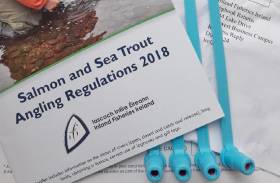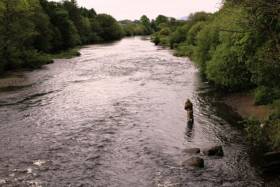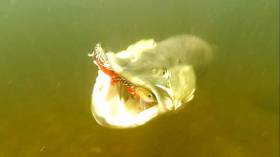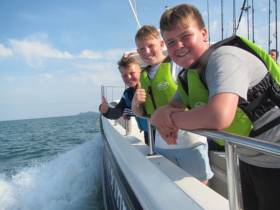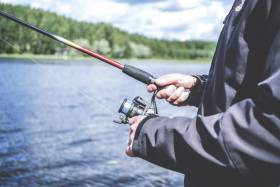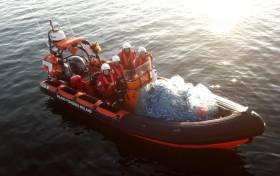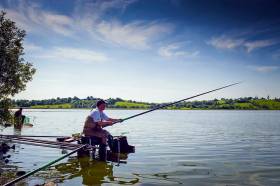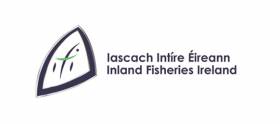Displaying items by tag: Inland Fisheries Ireland
Try Out Angling At The National Ploughing Championships This Week
#Angling - Novice anglers are invited to try their hand at fishing at the upcoming National Ploughing Championships.
Inland Fisheries Ireland will attend the three days that kick off in Screggan near Tullamore, Co Offaly from tomorrow, Tuesday 18 September, with a fun fishing simulator suitable for all the family.
The simulator will be present at IFI stand within the Department of Communications, Climate Action and the Environment’s tent at the championships.
Fisheries officers will be on hand to answer questions from members of the public around best farming practice on waterways, and how to take up angling as a novice, as well to provide information and guidance around Ireland’s fish species and the aquatic environment.
There will also be aquariums with a range of coarse and game fish species on display.
“The participation of the public in the fisheries resource is vital in ensuring it is protected and enhanced in a sustainable manner for both the recreational and economic benefits it offers to communities nationwide,” says Suzanne Campion, IFI’s head of business development.
“We are looking forward to sharing insights into the fisheries resource, and the indigenous fish species that live within it, with both the general public and the farming community.”
Also exhibiting at the National Ploughing Championships this year are Leave No Trace Ireland and the Marine Institute’s Explorers Education Programme, who aim to highlight the impact of plastics in our oceans at their stand in the the Department of Community and Rural Affairs tent.
“A truckload of plastic waste finds its way into the ocean every minute of every day, and it is estimated that by 2050 there could be more plastic by weight than fish in the ocean unless behaviours change,” explains Maura Lyons, chief executive of Leave No Trace Ireland.
“Although we are all contributing to this worldwide epidemic, recent campaigns such as Say #No to Plastic have generated an amazing amount of supporters at community levels – particularly with children and families wanting to create change.”
With the research being completed in Ireland and around the world, results of plastics making their way into the ocean are showing a significant impact on the marine environment and animals.
Unprecedented levels of microscopic plastic particles were recently detected in an oceanic survey carried out by phytoplankton, biotoxin and oceanographic scientists from the Marine Institute.
From the larger plastics to clothes fibres from our washing machines all making their way into the ocean, visitors to the Leave No Trace/Explorers Education stand will get an opportunity to learn how long it takes for single-use plastic to break down, as well as receiving tips on how to go plastic free.
Those attending will also get to see live native marine species that are typically found in rock pools around the Irish coast including dogfish, plaice and starfish in the Explorers display boat.
“It is great to see an increased interest from children, schools, communities and businesses in Ireland that have already committed to reducing single-use plastics by offering alternatives for customers,” Lyons says. “These small changes can result in big impacts, which will help encourage a change in behaviours.”
Salmon & Sea Trout Anglers Reminded To Submit 2018 Logbook & Gill Tags
#Angling - Salmon and sea trout anglers are reminded of the importance of returning their 2018 angling logbook and unused gill tags to Inland Fisheries Ireland.
These returns provide vital information and facilitate informed decision-making on Ireland’s wild Atlantic salmon and sea trout stocks, according to the fisheries body.
Anglers are asked to return their logbook as part of the Wild Salmon and Sea Trout Tagging Scheme, which regulates salmon and sea trout fishing in Ireland and is administered by Inland Fisheries Ireland.
In accordance with this scheme, anglers are required by law to return their completed logbook and all unused tags to the issuing office once they have finished fishing for the season, or as soon as the season is over at the end of September and no later than the 19 October annually.
Anglers are reminded that they can only retain a maximum of one salmon per day in a fishery with a surplus, provided they still have remaining tags in the month of September.
The return of logbooks and tags can be done via the business return envelope which was supplied at the time of license purchase. In the absence of such an envelope, anglers can return their completed logbook and unused tags to the IFI office addressed on their licence/logbook.
The records from this year’s angler returns will support management decisions in 2019.
As part of the scheme, an angler must attach a valid gill tag to a salmon (any size) or sea trout (over 40cm) immediately on landing. They then must enter the details of the catch and gill tag used into their logbook. If the fish is to be released, anglers must also make a catch record in their logbook.
IFI chief executive Dr Ciaran Byrne said: “As the end of season approaches, we are reminding salmon and sea trout anglers to return their logbooks and unused tags as soon as possible.
“The vast majority of anglers appreciate the importance of their data in terms of the conservation of our precious fisheries resource.”
For more information on the Wild Salmon and Sea Trout Tagging Scheme and IFI, visit www.fisheriesireland.ie. Any queries in relation to the scheme can be sent to [email protected].
Voluntary Halt On Catch & Release Salmon Angling Is Lifted
#Angling - Inland Fisheries Ireland advises anglers that, where conditions are suitable locally, catch-and-release angling for salmon may be resumed after the lifting of an appeal for a voluntary halt.
The fisheries body thanks all anglers for their assistance since the appeal made after July’s high water temperatures and drought conditions, which called for a cessation of fishing in catch-and-release rivers or where bag limits had been reached on open rivers.
While there are still low water levels in many parts of the country, water temperatures have now returned to within normal limits.
New Angling Bye-Laws For Corrib Catchment In Galway & Mayo
#Angling - Seán Kyne, Minister of State with responsibility for the inland fisheries sector, has signed off three new angling bye-laws which affect the Corrib catchment in Galway and Mayo.
The bye-laws, which have been requested by local angling clubs, concern the Abbert and Grange Rivers, the Clare River and the Cong River and Canal, and reflect the support of the clubs for the conservation imperative and the sustainable management of the local fisheries resource.
The Abbert and Grange Rivers (Annual Close Season) Bye-Law extends the closed season for all angling on the Abbert and Grange Rivers by two months to cover the period from the 1st of September until the 31st of March annually.
This bye-law is being introduced at the request of the angling clubs on the Clare system and will act as a vital conservation measure.
Both rivers make a significant contribution to wild brown trout stocks in the Clare River system and Lough Corrib. The new bye-law will afford greater protection to spawning salmonids in these two very important tributaries of the Clare River.
The Western Fisheries Region River Clare (Revocation) Bye-Law permits all legal angling methods on the Clare River from Daly’s Bridge in the townland of Corrandrum to a point 300 metres upstream of the footbridge at Anbally in the townlands of Anbally and Turloughmartin, Co Galway.
This section of river was previously restricted to fly fishing only. However, this new bye-law will bring this short section of the river into line with the rest of the Clare River. This bye-law was introduced at the request of the local angling club.
The Upper and Lower Limits of Cong River and Cong Canal Bye-Law clearly defines the upstream boundary between Lough Mask and the Cong Canal and the downstream boundary between the Cong River and Lough Corrib.
The purpose of the bye-law is to enable the effective enforcement of legislation governing the open angling seasons for trout and salmon on the Cong Canal/River as these differ from the open seasons for these species on Loughs Corrib and Mask.
This bye-law will also remove any difficulty in identifying the correct angling season at the extremities of the Cong River/Canal and will afford greater protection to highly prized ferox trout which are known to spawn in the Cong River/Canal.
“We welcome the introduction of these bye-laws in Galway and Mayo which will help us to enforce relevant legislation and enhance the resource in the long term,” said Inland Fisheries Ireland chief executive Dr Ciaran Byrne.
“The introductions of these bye-laws follow public consultations whereby stakeholders were invited to input their views and insights into the proposed new regulations. Inland Fisheries Ireland’s fisheries officers will now protect these rivers in line with the new laws in place.”
Anglers are requested to familiarise themselves with the details of the new bye-laws, which can be found on the website of the Department of Communications, Climate Action & Environment.
Pike In Irish Waters Have Changed Their Diet, New Research Indicates
#Angling - Pike in Irish waters may have changed their diet preferences, according to a new report launched this week by Inland Fisheries Ireland.
The report looks at new research carried out in 2016 on Lough Conn in Co Mayo and Lough Derravaragh in Co Westmeath and provides an insight into the dietary habits of pike.
Previous dietary research carried out in the 1960s and 1970s in Lough Derravaragh and Lough Sheelin (located across Westmeath, Meath and Cavan) indicated that pike preferred to eat brown trout and perch.
However, this latest research reveals that pike appear to have changed their prey preference and now predominately eat roach.
Researchers in Scotland and England have also found similar changes in pike diet occurring in Scotland (at Loch Lomond) and England (at Lake Windermere). It is thought the changes in diet are due to the invasion of roach in these waters.
The research examines whether pike and brown trout can co-exist in the same habitat. Using statistical models, it found that the species could live together within relatively large deep lakes with strong stream connectivity. However, in small, low-complex systems, pike introductions could potentially have a devastating impact on resident brown trout populations.
The practice of pike removal and the impact it has on brown trout stocks is also examined. The findings suggest that pike removal may only be effective in protecting brown trout populations in systems where trout are the only available prey, but may have little effect in systems where other prey, such as roach, is available.
“This research was initiated to answer some ongoing questions relating to the dietary preference of pike and the pike-brown trout interactions in lakes across Ireland,” said IFI chief executive Dr Ciaran Byrne. “Previous studies in this area were carried out more than 50 years ago which is a long time within our changing lake systems.
“This research is important as it gives an insight into the behaviour of the pike species and provides updated information around their relationship with brown trout. The changing food web and altered preferences of predators in the water systems highlights the need for continued monitoring and updated data to inform effective management strategies.
“This research will now be considered alongside the many historic, socio-economic and management factors which all inform fisheries management and development work. Inland Fisheries Ireland uses the best available scientific information to underpin management decision making and advice.”
For further information visit www.fisheriesireland.ie/pikeresearch.
#Angling - Inland Fisheries Ireland (IFI) is calling on youth clubs, community groups and schools in the Greater Dublin Area to take part in its Dublin Angling Initiative.
The fishing programme aims to promote, develop and improve angling among children and young people in the city and surrounds.
Last year, more than 420 children and young people took part in the programme which caters for anyone interested in angling, from the complete novice to the more advanced angler, with exposure given to each of the different types of fishing.
The initiative offers children and young people an opportunity to take fishing lessons, participate in fishing trips and enjoy family fishing days.
In addition to practical fishing exercises, presentations and tours provide an insight into fish, their habitat, conservation measures and education regarding local fishing areas.
IFI’s Dublin Angling Initiative has seen thousands of young people participate over the past 20 years, resulting in the establishment of many new fishing clubs.
Brian Beckett, IFI director of the Eastern River Basin District, said: “We are calling on youth clubs, community groups as well as national and secondary schools who would like to try out a new hobby this summer.
“Fishing is a pastime which can be enjoyed at any age or ability. The Dublin Angling initiative introduces young people to the pursuit, giving access to fishing equipment, guidance around how and where to fish and building awareness around the importance of protecting and conserving our fisheries resource and the broader aquatic environment.”
Some availability remains for angling activities in August, September and October, and IFI invites any groups who are interested to get in touch without delay as places are limited. Interested groups should contact Rory Keatinge, co-ordinator of the Dublin Angling Initiative, at [email protected] or 087 614 2906.
Dormant Accounts Funding To Develop Youth Angling
#Angling - Inland Fisheries Ireland (IFI) has been awarded funding to develop angling among young people as part of the Dormant Account Action Plan 2018.
“Inland Fisheries Ireland was chosen as a recipient of two funding measures which will engage and support young and novice anglers in Ireland,” said Seán Kyne, Minister of State for Rural Affairs and Natural Resources, announcing the funding yesterday (Thursday 19 July).
“The funding will see the development of a new novice angling strategy, a scheme to support angling events for novice and youth anglers and the appointment of five Regional Outreach Co-ordinators”.
Novice Angling Strategy (€70,000)
This measure will see the development of a Novice/Youth Angling Strategy and a scheme to support events for disadvantaged groups, angling hubs and coaches to ensure a safe environment for youths and vulnerable adults. IFI will continue to support Angling for Youth Development Ireland (AFYDI) and the Angling Council of Ireland (ACI) who facilitate the formation of angling hubs nationally to increase access to angling through the provision of trained coaches and safe fishing.
Go Fishing - Novice Angling Initiative (€323,250)
This project will see the appointment of five regional Outreach Coordinators in the major urban areas who will work with Angling for Youth Development Ireland, the Angling Council of Ireland and other angling organisations to increase the numbers engaging in angling across the regions.
The Dormant Account Action Plan allocates €40 million in funding to 45 measures nationwide. Its funding supplements the support already allocated by IFI to youth angling via the National Strategy for Angling Development (NSAD). These five appointments, together with NSAD supported posts, will deliver national education and outreach and novice angling briefs.
The funding will also allow IFI to properly resource a novice angling strategy which will incorporate one of its existing youth angling programmes, the Dublin Angling Initiative, and the many other education and outreach initiatives which are taking place across the country. It will also reach out to and include angling and voluntary organisations nationwide.
“We are delighted to welcome this funding, which will support us in growing the numbers of novice and youth anglers in Ireland,” said IFI chief executive Dr Ciaran Byrne. “Recent socio-economic studies of recreational angling in Ireland reveal that of the 325,000 anglers in Ireland, 37% are over 55 years of age and 49% are in the 35-54 age bracket. We know however that 83% of primary school students we surveyed want to go fishing.
“There is a huge opportunity for us to engage the next generation around our natural fisheries resource and to introduce them to angling, a pastime they can enjoy at any age or ability with many health and wellbeing benefits. The Dormant Account funding will help us realise our ambitious objectives of growing participation in fishing nationally and secure the future of our resource as a result.
“We look forward to working closely with angling groups and communities across Ireland in the development of a new Youth Angling Strategy and the roll out of related novice angling initiatives.”
Illegal Salmon Netting in Donegal, Inland Fisheries Ireland Identifies 'Two Significant Cases'
Inland Fisheries Ireland has seized 26 untagged salmon in The Glenties area in Donegal and 1,100 yards of illegal salmon drift nets off Inishbeg Island. The seizures were secured last week by Inland Fisheries Ireland’s Fisheries Officers who are based in Donegal.
The first seizure took place following covert surveillance by Fisheries Officers which resulted in 26 untagged salmon being identified. The second seizure occurred at Inisbeg Island later the same day while Fisheries Officers were conducting sea patrols along the North West coast of Donegal. Two drift nets, measuring 600 yards and 500 yards respectively, were located drifting east of Inishbeg Island and were seized together with two salmon.
The Fisheries Officers were utilising the first of a new fleet of 7.8 Delta RIB boats recently commissioned by Inland Fisheries Ireland and officially launched by the Minister of State for Inland Fisheries, Sean Kyne and Joe McHugh TD, Minister with responsibility for Gaeilge, Gaeltacht and the Islands in Rathmullan, Co. Donegal last month.
Dr Milton Matthews, Inland Fisheries Ireland Director of the North West River Basin said: “Both incidents highlight the importance of ongoing Inland Fisheries Ireland offshore and coastal patrols to protect migrating salmon and sea trout stocks against illegal fishing activity at a time when salmon stocks are under severe pressure from high temperatures, very low water levels and a long term decline in survival rates at sea.
The value of prompt and accurate information from concerned members of the public who report instances of suspected illegal activity or pollution alerts cannot be overstated. Information may be passed directly to local Inland Fisheries Ireland staff or by phoning our confidential Hotline number on 1890 34 74 24 or 1890 FISH 24.”
#Angling - Inland Fisheries Ireland (IFI) is appealing to anglers and fishery managers to voluntarily cease salmon angling on catch-and-release rivers with immediate effect due to high water temperatures and the current drought conditions.
The agency also advises that for conservation purposes on open rivers, anglers should cease angling once their daily bag limit is reached.
With regard to keep nets on coarse fisheries, IFI advises that this practise should be suspended at this time.
IFI says it will monitor the situation and issue updates as appropriate. Should the current weather conditions continue, the agency may consider the introduction of emergency conservation legislation.
Inland Fisheries Ireland & OPW Commit To Five-Year Working Agreement On Flood Risk Management
#Angling - Inland Fisheries Ireland (IFI) and the Office of Public Works (OPW) Flood Risk Management Unit have signed a new shared service agreement which will see them continue collaborate over the next five years in the protection of fishery requirements while carrying out flood risk management activities.
The agreement will see both parties work closely together to help ensure the country’s statutory drainage objectives are achieved, with a focus on the protection of fishery habitats and resources.
The OPW is the lead statutory body for drainage maintenance and flood risk management (FRM) in the State, while IFI is the statutory body responsible for the protection and conservation of the inland fisheries resource.
The agreement, which spans from 2018 until 2022, has been secured at a time when Government investment in flood risk management operations is increasing.
It follows the recent publication of the Government’s Flood Risk Management Plans which will see some €1 billion in funding under the National Development Plan invested in projects across the country to mitigate flood risk.
This new partnership formalises the historical working relationship between the IFI and the OPW and commits them to continuing their positive engagement for Ireland’s fishery habitats and resources.
Under the agreement, both parties will work across the Environmental River Enhancement Programme (EREP) and will focus on:
A series of scientific investigations to further understand environmental impacts of river maintenance works.
Development of best practice to minimise environmental impacts and maximise environmental gain of river maintenance and flood relief activities.
Work programmes to identify barriers to fish passage on arterially drained rivers that have potential for improvements works.
Work elements to assist achieving so that all waters will attain ‘Good’ ecological status by a specified date, as per the Water Framework Directive.
The aim is to provide a science-based platform to the IFI-OPW links. For example, scientific investigations will provide an evidence base for determining the appropriateness or otherwise of undertaking physical river enhancement works in locations to bring about improved Ecological Quality Ratio (EQR) scores.
Facilitated by IFI surveys, an EQR will be generated for the fish community and the physical form of the river at each site. This will inform all requests to OPW from third parties, such as angling clubs or community groups, to undertake such works. IFI will be taking a prioritised approach in undertaking surveys and could handle a small number of cases annually.
“We are delighted to re-engage with the OPW and continue to foster the high levels of understanding of fishery requirements within flood risk management activities while also ensuring statutory drainage objectives are realised. Together, we will secure the future of our rich natural fisheries resource,” said Suzanne Campion, IFI’s head of business development.
John Curtin, director of engineering services with the OPW, added: “This agreement is a proactive one in terms of delivering environmental gain, while still balancing the drainage/flood relief functions for our communities and demonstrates how two public authorities working in partnership can achieve more that the organisations could working individually.”



























